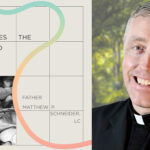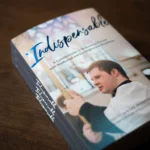A few weeks ago, I was preaching about how we should be cautious about our words, and in so doing I made the analogy between our words and the Word of God, as in Jesus, the Word made flesh. All was well until I had to preach in Spanish as well. In Spanish, John 1 does not refer to the divine “Word” that became flesh, but literally the divine “Verb” that became flesh. This is one example of language changing the meaning of phrases, so a basic translation is insufficient.
The “Verb” Became Flesh
Reasons exist for this: a combination of noun gender where “word” is feminine and the Spanish word for “verb” (verbo) comes from the Latin word for “word” (verbum). However, my goal here is not to look at etymology or the history of Bible translations, but to explore how this and other slight changes in language can affect our theology. This piece is not meant to be an in-depth academic discussion of this theme but provide several examples, mainly Spanish versus English, to provide a form of inductive reasoning so we are aware and can consider how language implicitly affects our theology.
In this first example, we can see how using “Verb” here emphasizes God’s immense action better, but “Word” seems to show God’s wisdom better. The original Greek word in John 1, Logos, has a broader meaning that is lost in both translations. It can mean doctrine, knowledge, or wisdom and it has come into English mostly as the study of things like biology, paleontology, or theology. When we look it up in Strong’s Concordance (Bible dictionary that lists all instances of the word in the Bible), it gives multiple meanings: a word, what someone has said, discourse, doctrine, narrative, matter under discussion, reason, the mental faculty of thinking, account, and cause. Having this broad spectrum of meanings helps us better understand the Gospel. Thinking of Jesus as “The Word” without this broader perspective can limit our view of God.
Now I can see how Jesus as the Logos goes beyond just something uttered by the Father to God’s wisdom, action, doctrine, etc. Then, when I go back to English and just say “word,” it can be a more limited view of what St. John wrote. All language fails when speaking of God.
Having vs. Being in Language

Another example is that in English, I am X years old and Y feet tall. In Spanish, I have X years and have Y meters. Being is more internal than having. A big part of Christian theology is our nature as both physical and spiritual creatures: most Christians agree we are both, but the exact way we are both is a topic of large debate. Language can presuppose an answer to that debate. What I am is more intimate to me while what I have is more external: I am a son of my parents, but I have a Green Card. The Green Card helps explain my life situation, but it is far less essential to my identity than my parents.
Having size or age puts this as more external than being them. It implicitly almost presupposes a “real me” separate from the physical me: a more dualistic view of how we are both body and spirit. But if I am my height, that language indicates that I am my body more clearly: a greater unity between body and spirit.
What Does It Mean “to Be”
English can go almost too far in using “to be” for ourselves as we say we are hungry or cold, while Spanish says a person has hunger or cold. My hunger and cold are temporary and not key to my identity. It seems some might interpret this as being our bodies so strongly that we cease to fully be our souls.
Spanish also has two versions of “to be” which can have different meanings. One (estar) came from the verb “to stand” and is used for location or temporary things while the other (ser) is used in most other cases. In English when we say Jesus is the creator and is in the Eucharist, we must use the same word, while Spanish can say he is (ser) the creator and is (estar) in the Eucharist. This way when the Eucharist is digested, Jesus no longer is (estar) in the Eucharist in the same way (obviously, God is present everywhere in some way and Christians can debate the nature of Jesus being present in the Eucharist). It can also affect anthropology distinguishing someone who is sick (estar) with a cold or covid compared to one who is sick (ser) in the head, or mentally unwell.
There are plenty of other examples, some of which are more extreme, especially once we are outside Indo-European languages. I chose to focus on Spanish as I know multiple examples in it, and I think that would be one of the languages other than English that my readers would be most likely to know. The challenge is to recognize the theological implications of linguistic structure or slight changes in definitions.
The Schism East-West Based Partially on Misunderstanding Language
One part of the explanation for the East-West Schism comes down to language. This schism was over the Pope adding “and the Son,” so the Western Nicaean creed reads “who proceeds from the Father and the Son.” However, the word we translate as “proceed” has a slightly different meaning between Latin and Greek. Catholics and Orthodox even make a joint statement on this issue in 2003 that noted this:
Much of the difference between the early Latin and Greek traditions on this point is clearly due to the subtle difference of the Latin procedere from the Greek ekporeuesthai [both translated “proceed” in English]: as we have observed, the Spirit’s “coming forth” is designated in a more general sense by the Latin term, without the connotation of ultimate origin hinted at by the Greek.
Back in 1054, neither the Eastern nor Western Church realized this slight difference in definitions and how it affected their theology. The danger of language for theology is when such linguistic matters remain unexamined.
In discussions with others, I have noted how we were speaking past each other at first and actually had more agreement than we first thought, but different language clouded our discussion.
Conclusion: We Need to Understand Our Linguistic Biases
As humans, language structures our understanding of the world in ways we struggle to understand from within a single language. We can be stuck in a certain perspective based on our language and not even realize it. We shape language but language shapes our thought patterns.
Ultimately, we need to have a perspective beyond human language. God is beyond human language. Even human love is often beyond language if you ask one spouse to express the fullness of their marital love in words. God’s love is so much beyond the love of the best human couple. He is love. So many of those who have deep prayer experiences are at a loss for words. Nonetheless, there is value in attempting to express such things in words. We just need to know where our human language comes up short or where if implicitly favors one theological view over another.
As I noted near the beginning, this is not meant to be an intense theological discussion of linguistics, but give some examples that make us each consider how language affects how we view God, ourselves, others and our universe. The greatest danger with such language is remaining unexamined.






